Compliance and Regulation Law bilingual Dictionnary

Competition is the law of the market. It allows the emergence of the exact price, which is often referred to as "fair price". It means and requires that agents on the market are both mobile, that is to say free to exercise their will, and atomized, that is to say, not grouped together. This is true for those who offer a good or service, the offerers, as well as for those seeking to acquire them, the applicants: the bidders seek to attract the applicants so that they buy them the goods and services that they propose. Bidders are in competition with each other.
In the competitive market, buyers are indulging in their natural infidelity: even if they have previously bought a product from an A supplier, they will be able to turn away from him in favor of a B supplier if the latter offers them a product more attractive in terms of quality or price. Price is the main signal and information provided by the suppliers on the market to excite this competitive mobility of the offerers. Thus, free competition accelerates market liquidity, the circulation of goods and services, raises the quality of products and services and lowers prices. It is therefore a moral and virtuous system, as Adam Smith wanted, a system which is the fruits of individual vices. That is why everything that will inject "viscosity" into the system will be countered by Competition Law as "non-virtuous": not only frontal coordination on prices but for example, exclusivity clauses, agreements by which companies delay their entry on the market or intellectual property rights which confer on the patentee a monopoly.
Admittedly, Competition Law can not be reduced to a presentation of such simplicity, since it admits economic organizations which deviate from this basic model, for example distribution networks or patent mechanisms on which, inter alia, is built the pharmaceutical sector. But the impact is probative: in the sphere of Competition Law, if one is in a pattern that is not part of the fundamental figure of the free confrontation of supply and demand, he has to demonstrate the legitimacy and efficiency of its organization, which is a heavy burden on the firm or the State concerned.
Thus, in the field of Regulation, if regulatory mechanis were to be regarded as an exception to competition, an exception admitted by the competition authorities, but which should be constantly demonstrated before them by its legitimacy and effectiveness in the light of the "competitive order", then public organizations and operators in regulated sectors would always face a heavy burden of proof. This is what the competition authorities consider.
But if we consider that regulated sectors have a completely different logic from competitive logic, both from an economic and a legal point of view, the Law of Regulation refers in particular to the notion of public service and having its own institutions, which are the regulatory authorities, then certain behaviors, in particular monopolies, are not illegitimate in themselves and do not have to justify themselves in relation to the competitive model, for they are not the exception ( Such as the public education or health service).

March 29, 2025
Publications

🌐follow Marie-Anne Frison-Roche sur LinkedIn
🌐subscribe to the Newsletter MAFR Regulation, Compliance, Law
🌐subscribe to the Video Newsletter MAFR Surplomb
____
 ► Full Reference: M.-A. Frison-Roche, The Contract, a Compliance tool: the Obligation for a platform to control content CE, 27 January 2025, B. c/ CNIL, Working Paper, March 2025.
► Full Reference: M.-A. Frison-Roche, The Contract, a Compliance tool: the Obligation for a platform to control content CE, 27 January 2025, B. c/ CNIL, Working Paper, March 2025.
____
🎤 This Working Paper was developed as a basis for the Overhang👁 video on 29 March 2025 : click HERE (in French)
____
🎬🎬🎬In the collection of the Overhangs👁 It falls into the News category.
►Watch the complete collection of the Overhangs👁 : click HERE
____
► Summary of this Working Paper: The ruling handed down on 15 January 2025 by the Commercial, Economic and Financial Chamber of the French Judicial Supreme Court (Cour de cassation) provides a solution to the issue of content control in the digital environment. It resolves what appears to be the aporia so often emphasised, and even claimed, namely the impossibility of developing an effective controlling technology.
To do this, the Court disregarded the applicable laws and referred to the electronic payment contract between the bank and the platform, which contained a clause on Vigilance against unlawful content, linked to a termination clause. It held that this clause was fully effective. This solution, so simple and so strong, can make a major contribution to regulating the digital space, if the banks so wish, because what platform can do without reliable electronic payment services?
____
🔓read the developments below⤵️
Jan. 15, 2025
Thesaurus : 02. Cour de cassation

► Référence complète : Com., 15 janvier 2025, n° 23-14.625, Société Générale c/société Dstorage.
____
____
🚧lire le document de travail qui en fait l'analyse
____

June 24, 2024
Organization of scientific events
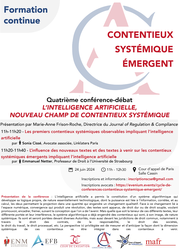
► Full Reference: L’intelligence artificielle, nouveau champ de Contentieux Systémique (Artificial intelligence, new field of Systemic Litigation), in cycle of conferences-debates "Contentieux Systémique Émergent" ("Emerging Systemic Litigation"), organised on the initiative of the Cour d'appel de Paris (Paris Cour of Appeal), with the Cour de cassation (French Court of cassation), the Cour d'appel de Versailles (Versailles Court of Appeal), the École nationale de la magistrature - ENM (French National School for the Judiciary) and the École de formation des barreaux du ressort de la Cour d'appel de Paris - EFB (Paris Bar School), under the scientific direction of Marie-Anne Frison-Roche, June 24, 2024, 11am-12.30pm, Cour d'appel de Paris, Cassin courtroom.
____
🌐see on LinkedIn the report made of this event
____
► Presentation of this conference-debate: Artificial intelligence has enabled the creation of an algorithmic system. This develops its own logic, which is essentially technological in nature. It generates computing power based on the correlation of information to produce possible causalities and build probabilities that are sometimes likened to "predictions", with the mass processed eventually generating a qualitative change.
This change is linked to the digital space itself, which by its very nature gives rise to systemic disputes and litigation, to which the conference-debate on 27 May 2024 was devoted.
There are three ways in which this Emerging Systemic Litigation is involved, and it is important to anticipate these, as the litigation is either in its infancy or still to come, but will undoubtedly arise suddenly.
Firstly, it is possible that the technological tool will make it possible to deal with certain cases where the technical nature of either the concepts or the requests, or the multitude of requests, however simple, require this ability to deal with the mass, which leads to an increase in both the mechanical power of algorithms and the greater presence of human beings, in particular through the increase in adversarial proceedings, pre-trial proceedings, mediation, etc.
Secondly, in the face of this change linked to the digital environment, 'texts' have appeared to 'regulate' the use or the very invention of this or that algorithmic tool, texts of a very diverse nature, from the most soft to the hardest (this gradation between soft and hard law is the theme taken up in the conference-debate of 19 September 2024). These may be measures taken by the firms that produce the tools, those that use them, or those that disseminate them, with the people affected by the information being relatively active. This last point explains why systemic disputes are already underway, concerning the subjective rights that would be violated either by the very nature of artificial intelligence, in this case the rights of content producers, or the rights to privacy, or protection of other Monumental Goals. The systemic and extra-territorial dimension of these disputes has already been established.
The third point is the role of Politics, since the European Union, through the texts currently being adopted, has established that the Goal is not only the sustainability of the technical system, the innovation market and European sovereignty, but also the primacy of people and individuals, through a method that is the Ex Ante ranking of risks. This conception is also contested. This methodological issue also applies to judges.
This Emerging Systemic Litigation is and will be brought before various regulatory or supervisory Authorities, but also before the administrative and judiciary courts, in particular through Contract Law, Tort Law, Company Law, Labour Law, General Procedural Law, etc.
The aim here is to measure and anticipate the way in which the systemic dimension of these disputes will be incorporated into future litigation.
____
🧮Program of this manifestation:
Fourth conference-debate
L’INTELLIGENCE ARTIFICIELLE, NOUVEAU CHAMP DE CONTENTIEUX SYSTÉMIQUE
(ARTIFICIAL INTELLIGENCE, NEW FIELD OF SYSTEMIC LITIGATION)
Paris Court of Appeal, Cassin courtroom
Presentation and moderation by 🕴️Marie-Anne Frison-Roche, Professor of Regulatory & Compliance Law, Director of the Journal of Regulation & Compliance (JoRC)
🕰️11am.-11.10am. 🎤Les deux rencontres entre l'intelligence artificielle et le Contentieux Systémique (The two meetings between Artificial Intelligence and Systemic Litigation), by 🕴️Marie-Anne Frison-Roche, Professor of Regulatory & Compliance Law, Director of the Journal of Regulation & Compliance (JoRC)
🕰️11.10am-11.30am. 🎤Les premiers contentieux systémiques observables impliquant l’intelligence artificielle (The first observable Systemic Litigations involving artificial intelligence), by 🕴️Sonia Cissé, Partner, Linklaters Paris
🕰️11.30am-11.50am. 🎤L’influence des nouveaux textes et des textes à venir sur les contentieux systémiques émergents impliquant l’intelligence artificielle (The influence of new and forthcoming legislation on Emerging Systemic Litigation involving artificial intelligence), by 🕴️Emmanuel Netter, Professor of Law at Strasbourg University
🕰️11.50am-12.30pm. Debate
____
🔴Registrations and information requests can be sent to: inscriptionscse@gmail.com
🔴For the attorneys, registrations have to be sent to the following address: https://evenium.events/cycle-de-conferences-contentieux-systemique-emergent/
⚠️The conference-debates are held in person only, in the Cour d’appel de Paris (Paris Court of Appeal).
____
🧮Read below the report made of this event by Marie-Anne Frison-Roche⤵️
March 15, 2023
Thesaurus : Doctrine
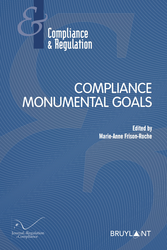
► Full Reference: A. Mendoza-Caminade, "Proportionality and Evaluation. The Example of Intellectual Property Law", in M.-A. Frison-Roche (ed.), Compliance Monumental Goals, coll. "Compliance & Regulation", Journal of Regulation & Compliance (JoRC) and Bruylant, 2023, p. 221-236.
____
📘read a general presentation of the book, Compliance Monumental Goals, in which this article is published.
____
► Summary of the article:
________
Dec. 18, 2019
Publications
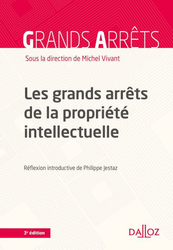
Référence complète : Frison-Roche, M.-A., Le maniement de la propriété intellectuelle comme outil de régulation et de compliance, in Vivant, M. (dir.), Les Grands Arrêts de la propriété intellectuelle, 3ième éd., 2019, 9-11, p.43-53.
This contribution is written in French.
Summary:
Intellectual Property, which comes from the State and is incorporated into public policy, can be designed not to reward the creator a posteriori, but to encourage others to innovate. It is then an Ex Ante regulatory tool, an alternative to the subsidy. If private copying is an exception, it is not in relation to the principle of Competition but in an insertion into a system of incentives, starting from the costs borne by the creator of the first innovation: the rights holder is then protected , not only according to a balance of interests involved but in order not to discourage innovative potentials and the sector itself. (1st decision) ;
The sectoral policy then permeates Intellectual Property, used to regulate a sector, for example that of the drug. While it is true that a laboratory wishing to market a generic drug did not wait for the expiration of the patent for the original drug to do so, it is however not relevant to sanction this anticipation by a few days because the investments made by the holder of the Intellectual Property right have been made profitable by this one and because the public authorities favor the generics in a concern of public health (2nd decision).
Systemic interest prevails and therefore Internet service providers have to bear the costs of blocking access while they are irresponsible because of the texts. This obligation to pay is internalized by Compliance Law because they are in the digital system best able to put an end to the violation of Intellectual Property rights which the ecosystem requires to be effective. (3rd decision).
Read the contribution (in French).
______
Sept. 27, 2019
Conferences
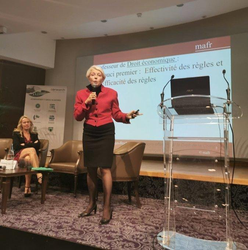
Generale Reference : Frison-Roche, M.-A., Les solutions offertes par le Droit de la Compliance pour lutter effectivement contre les contrefaçons de masse (The solutions offered by Compliance Law to fight effectively against mass counterfeiting) , in Seminar of the Association des Praticiens du Droit Droit des Marques et des Modèles (APRAM), La contrefaçon de masse : va-t-on un jour réussi à y mettre un frein ? Quelques nouvelles pistes de réflexion (How to stop the mass Counterfeiting?, some new ideas), Paris, September 27, 2019.
Read the program of the Seminar. (in French)
This conference is based on the report given to the French Government and published in July2019 : The contribution of Compliance Law to the Governance of Internet.
It is also based on the new contribution to the new edition of the Grands Arrêts de la propriété intellectuelle : "Le maniement de la propriété intellectuelle comme outil de régulation et de compliance"(in French). This publication is based on this Working Paper : The use of Intellectuel Property as a tool for Regulatory and Compliance Perspectives.
Summary : In this seminar devoted to new ways of reacting to "mass counterfeiting", the idea here is to start from the observation of an increase in the ineffectiveness of intellectual property rights - and thus of the I.P. Law. Law being a practical art, it is not a simple inconvenience, it is a central question. This can be remedied by improving the Ex Post legal process, but we can think of finding Ex Ante mechanisms. The Regulatory Law is Ex Ante, but digital world is not a sector, it is the world itself. A promising direction is therefore Compliance Law, in that it is both Ex Ante and non-sectoral. The contribution shows how Compliance Law is already useful, could be developed and how it could be applied so that these specific rights could be effectively protected in a digital world, where for the moment counterfactors have in fact the means to ignore them.
See the slides. (in French)
Sept. 7, 2019
Blog

Lisant sur mon écran d'ordinateur un article en accès libre dans une revue en partie librement accessible numériquement, une mention attire mon attention.
Elle a de quoi laisser perplexe toute personne qui écrit des articles et ouvrage qui requiert des lectures, lectures dont on indique au lecteur la trace pour l'inviter à son tour à y procéder dans ses propres recherches. Dans des travaux de recherche, de découverte et d'interrogation, donc.
Voilà le texte de la mention. :
Des DOI (Digital Object Identifier) sont automatiquement ajoutés aux références par Bilbo, l'outil d'annotation bibliographique d'OpenEdition.
Les utilisateurs des institutions abonnées à l'un des programmes freemium d'OpenEdition peuvent télécharger les références bibliographiques pour lesquelles Bilbo a trouvé un DOI.
"sont automatiquement ajoutés" ?
Il s'agit littéralement d'un "outil d'annotation bibliographique" ?
Si l'on s'abonne (le prix n'est pas indiqué, mais quand on écrit "-ium", c'est pour dire que l'on sort du gratuit...; comme le fait l'entreprise américaine Academia qui propose rapidement de "upgrapder" par un service payant pour accéder ), automatiquement les références seront téléchargées dès l'instant que l'algorithme, répondant au nom de "Bilbo" (n'est-ce pas le nom d'un personnage dans Le seigneur des anneaux ?), mais qui dans le civil a un nom qui reproduit sa fonction (Digital Object Identifier) fonction exprimée en langue anglaise va "automatiquement ajouter" une référence aux autres références qui auront été tacquées par l'algorithme.
Est-ce raisonnable ? Est-ce efficace ? Est-ce sans danger ?
C'est mécaniquement efficace, dès l'instant que l'on conçoit la référence bibliographique comme un "entassement mécanique" (I). Mais la référence bibliographique est et doit être tout autre chose, ce que les machines ne peuvent en rien restituer : être le reflet du parcours intellectuel que l'être humain qui écrivit l'article ou l'ouvrage fit pour écrit ce texte-là, une invitation à la lecture (et les machines ne lisent pas, on en arrive aujourd'hui à devoir le rappeler). Cette définition qui fut partagée de la bibliographie, qui ne mesure pas l'ampleur de l'empilement mais dessine ce vers quoi l'auteur s'est tourné pour chercher, pour trouver des réponses aux questions qu'il s'est posées, cela seul une personne peut le faire. En rien "Bilbo" (II). Or, si l'on se repose sur celui-ci, contre un abonnement, pour faire cette tâche-là, qui n'est reflet de rien, non seulement la bibliographie ne sera plus rien, mais des effets pervers, comme ceux observés comme celui des "citations", vont s'accroître (III).
Ensuite, si Bilbo écrit les bibliographie, tandis que Sophia fait les conférences, pourquoi un autre algorithme, que l'on pourrait appeler Thesarus ne pourrait pas écrire thèse, livre, essai, article, en ayant compilé toutes les règles formelles à respecter. Pourquoi non ? On se souviendra alors que les machines et les suites de chiffres ne lisent pas, n'écrivent pas, ne conçoivent pas, n'apprennent pas (l'expression Learning machine est un oximore), ne mémorisent pas (la "mémoire" d'un ordinaire n'est qu'une image), ne traduisent pas, n'ont pas d'émotion, n'aiment pas. Seuls les êtres humains le peuvent. Le sait-on encore ?
Lire ci-dessous une analyse plus détaillée.
April 4, 2019
Thesaurus : Doctrine
Référence complète : V. Magnier, Enjeux de la blockchain en matière de propriété intellectuelle et articulation avec les principes généraux de la preuve, Dalloz IP/IP, 2019, p.76 et s.
_____
Jan. 17, 2018
Editorial responsibilities : Direction of the collection "Cours-Série Droit privé", Editions Dalloz (33)
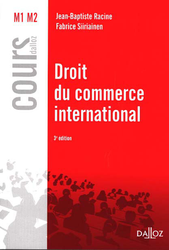
Référence complète : Racine, J.-B., et Siiriainen, F., Droit du commerce international, 1ière éd. 2007 - 3ième éd., 2018, Coll. "Cours Dalloz-Série Droit privé", Dalloz, 496 p.
Le droit du commerce international est devenu une discipline fondamentale à l'heure de la mondialisation de l'économie. Il s'agit d'un droit particulier : un droit par nature composite, fait de règles nationales et internationales, publiques et privées, qui mélange les règles de conflit et les règles matérielles et qui connaît le phénomène particulier de la lex mercatoria.
Outre les source du droit du commerce international, alimentées notamment par l'Organisation mondiale du commerce (OMC), l'ouvrage se propose d'étudier les opérateurs du commerce international, à savoir les sociétés et les États, les opérations du commerce international : vente, transport, distribution, sous-traitance, transfert de droits de propriété intellectuelle etc., et enfin de contentieux du commerce international à travers sa figure emblématique : l'arbitrage.
April 21, 2017
Blog

Through the Open Culture website, it is possible to listen to Hayao Miyazaki who, in March 2017, claimed that video games whose drawings are made on Artificial Intelligence basis are "insults to life".
Read below the history, the words that the Master has held, his conception of what is creation and "truly human" work, which is echoed by the definitions given by Alain Supiot, who also reflected on what robots do.
This brings us back to the very notion of "creation" and creative work.
_____
Read below

Sept. 21, 2016
Publications

Ce working paper sert de base à une conférence qui a lieu à Bordeaux le 23 septembre 2016.
Dans sa recommandation n°11, le rapport Lévy-Jouyet recommande la mise en ligne des données publiques pour améliorer le service public (open data), son financement se faisant au besoin par la publicité. C’est à un autre titre que par sa recommandation n°12, le rapport préconise d’aider la diffuser de la création française à l’étranger.
Dans une économie de l’immatériel devenue une « économie de l’accès », ces deux recommandations pourraient se rapprochent, se fondre peut-être. En effet, si l’on relit par exemple les « lieux de mémoires » de Pierre Nora, on observe que les personnes publiques portent le patrimoine immatériel de la France. Il est d’une grande valeur. Il a été créé notamment par l’Histoire. L’État en organise l’accès, par l’open data. En cela, il organise l’accès à une création collective. En cela, il remplit sa fonction de satisfaire le bien commun d’ouverture.
Mais l'on bute rapidement sur une difficulté, voire une aporie : comme l'exprime le rapport Lévy-Jouyet pour les données publiques l’accès à celles-ci doit être financé. De la même façon, l’accès aux "lieux de mémoires doit être financé". Et l'on voit à travers cette question financière la contradiction de l'open data : L’enrichissement par les opérateurs de l’accès sans aucune contrepartie est incompréhensible. Seule une licence de droit commun peut rétablir le caractère commutatif entre le dépositaire de la création immatérielle collectif qui est la personne publique qui perdure dans le temps (l’État) et celui qui tire profit de l’accès. Puisque chacun sait que la gratuité n’est pas un système sain, tandis que chacun dit que les licences open data ne sont pas effectives.
C'est pourquoi il convient d'examiner les règles juridiques qui gouvernent aujourd'hui ce que l'on appelle "l'open data" comme l'expression d'un droit d'accès à ce qui est à tout le monde mais qui est pourtant intouchable (I), le régime juridique montrant les contradictions de l'open data, ce à quoi le droit plus classique auquel le rapport renvoie par ailleurs pourrait répondre (II)
March 31, 2016
Conferences
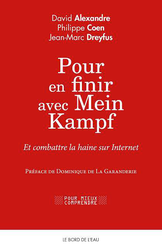
David Alexandre, Philippe Coen et Jean-Marc Dreyfus ont publié Pour en finir avec Mein Kampf et combattre la haine sur Internet.
Un débat est organisé à la Librairie Lamartine autour de l'ouvrage.
A l'ère numérique, un combat contre ce livre fait sourire certains. D'autres se mobilisent, notamment les éditeurs, parce qu'ils savent que le monde virtuel n'a pas fait disparaître les personnes et les livres. Pourtant, la haine dont ce livre ruisselle coule à flot grâce à la capillarité numérique et ce livre retrouve une nouvelle jeunesse, pour laquelle la tombée dans le domaine public n'est accessoire.
Faut-il ne rien faire, sous prétexte qu'on ne peut pas beaucoup ?
L'engagement dans une lutte doit-elle ses mesurer à l'aune de sa probabilité de succès et de l'ampleur de ses moyens par rapport aux moyens de l'objet combattu ?
Si l'on pense ainsi, alors il n'y aurait jamais dû avoir de Droit. Celui-ci a toujours perdu d'avance, face au crime, au désir, à la lâcheté et à l'indifférence. Situation de fait qui désespéra tant Sade.
Si l'on reprend la situation nouvelle constituée par le numérique, il y a tout d'abord ce qu'il est usuel d'appeler les "géants du numérique" sur lesquels Philippe Coen semble beaucoup compter.
Il y a aussi les personnes elles-mêmes. Dans lesquelles il ne faut pas tant désespérer. La haine n'est pas la choses la mieux partagée du monde. Non.
C'est la peur et la fatigue qui peuvent l'être, ce qui est différent. Ainsi, l'initiative "Respect zone" qui fait que chacun est maître chez soi, conception si classique et si française du Droit, est adéquate pour, non certes "en finir", mais mettre des bornes. Pour reprendre le vocabulaire du Droit romain.
Updated: Nov. 13, 2014 (Initial publication: )
Thesaurus : Doctrine
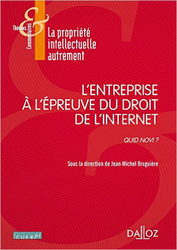
Référence complète : Bruguière, J.-M. (dir.), L'entreprise à l'épreuve du droit de l'Internet. Quid Novi ? , Série "La propriété intellectuelle autrement", coll. "Thèmes & Commentaires", Dalloz, 2014, 196 pages.
Consulter la table des matières.
Lire la présentation de l'article de Jean-Michel Bruguière : Les conditions générales d'utilisation sur l'Internet. Nouvelles règlementations de droit privé?
Aug. 26, 2014
Editorial responsibilities : Direction de la collection "Droit et Économie", L.G.D.J. - Lextenso éditions (30)
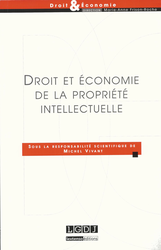
Référence complète : Vivant, M.( dir.), Droit et économie de la propriété intellectuelle, coll. "Droit et Économie", LGDJ - Lextenso, 2014, 194 p.
Il s'agit du 24ième volume de la collection "Droit et Économie".
Sous la direction de Michel Vivant, le fil de l'ouvrage reprend ce qui avait été le principe des conférences organisées par Marie-Anne Frison-Roche avec Guy Canivet à la Cour de cassation, à l'initiative de la Chaire Régulation, à savoir prendre un objet concret, sur lequel se posent une compétence d'une part économique, d'autre part juridique.
Ici, la propriété intellectuelle s'y prête particulièrement bien, puisque celle-ci est déjà un mixte de droit et d''économie. Elle est de plus en plus. On en viendrait bientôt à oublier que cela fût du droit pour croire qu'il ne s'agit que d'une branche de l'économie, à travers le souci de l'innovation notamment.
Dans cet ouvrage, c'est donc sous le double regard du droit et de l'économie que les enjeux de la propriété intellectuelle sont posés.
Lire la quatrième de couverture.
Lire la table des matières.
Consulter l'ensemble de la collection dans laquelle l'ouvrage a été publié.
Updated: July 31, 2013 (Initial publication: Sept. 6, 2011)
Teachings : Les Grandes Questions du Droit, semestre d'automne 2011

Sept. 16, 2010
Publications
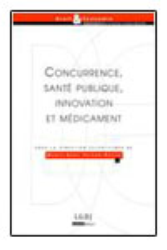
Références complètes : FRISON-ROCHE, Marie-Anne, Politique publique de la maîtrise de santé, protection de la santé publique, droit général de la concurrence et régulation sectorielle, in FRISON-ROCHE, Marie-Anne (dir.), Concurrence, santé publique, innovation et médicament, coll. "Droit et Économie", LGDJ - Lextenso édition, Paris, 2010, p.1-14.
Oct. 19, 2009
Conferences
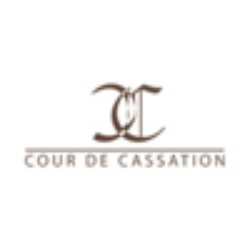
Référence complète : FRISON-ROCHE, Marie-Anne, Propriété intellectuelle, concurrence et régulation, in Droit et Économie de la propriété intellectuelle, Cour de cassation, 19 octobre 2009.
La propriété intellectuelle est, comme "sous tension" avec le droit de la concurrence, par sa logique de monopole et de durée, alors que le modèle de marché fonctionne sur la disponibilité des biens et l’instantanéité des mouvements économiques. L’enquête sectorielle du 8 juillet 2009 en matière de médicaments illustre encore une fois l’affrontement. Mais les propriétés intellectuelles peuvent exprimer des politiques de régulation de marchés, d’incitation à la recherche et investissement, de méthodes de diffusion d’informations. C’est pourquoi la régulation, branche du droit spécifique qui met en équilibre permanent le principe de concurrence et un autre principe, peut mieux "comprendre" les propriétés intellectuelles que ne le fait le droit de la concurrence.
March 31, 2008
Editorial responsibilities : Direction de la collection "Droit et Économie", L.G.D.J. - Lextenso éditions (30)
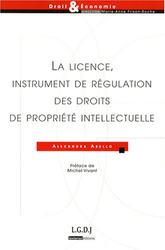
Référence complète : ABELLO, Alexandra (dir.), La licence, instrument de régulation des droits de propriété intellectuelle, préface de Michel Vivant, coll. "Droit et Economie", LGDJ - Lextenso éditions, 2008, 365 p.
March 5, 2008
Thesaurus : Doctrine
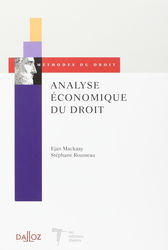
Référence complète : Mackaay, E., et Rousseau, S., Analyse économique du droit, coll. "Méthodes du droit", coédition Dalloz/ Thémis, 2008, 728 p.
Consulter la table des matières.
Lire la quatrième de couverture.
Aug. 17, 2005
Publications
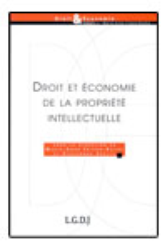
Référence complète : FRISON-ROCHE, Marie-Anne, L’interférence entre les propriétés intellectuelles et les droits des marchés : perspective de régulation, in M.-A. Frison-Roche et A. Abello, Droit et Economie de la propriété intellectuelle, coll. "Droit et Economie", LGDJ, 2005, pp.15-26.
Lire une présentation générale de l'ouvrage dans lequel l'article a été publié.
May 11, 2005
Editorial responsibilities : Direction de la collection "Droit et Économie", L.G.D.J. - Lextenso éditions (30)
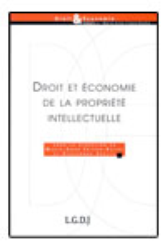
Référence complète : Frison-Roche, M.-A., et Abello, A. (Dir), Droit et économie de la propriété intellectuelle, coll. "Droit et Économie", LGDJ, 2005.
Lire l'avant-propos de Marie-Anne Frison-Roche.
Lire la présentation de l'article de Marie-Anne Frison-Roche.
La propriété intellectuelle fût longtemps l'apanage du droit. Elle est aujourd'hui partagée entre le droit et l'économie, quant elle n'est pas accaparée par la science économique, qui méconnaît alors parfois sa dimension juridique.
C'est pourquoi cet ouvrage collectif a pour objet de faire converger sur des thèmes communs les analyses juridiques et les analyse économiques.
Y contribuent Jean Tirole, Marie-Anne Frison-Roche, Richard R. Nelson, Eric Morgan de Rivery, Sabine Thibault-Liber et Jérémy Bernard, Thierry Sueur et Jacques Combeau, Thu-Lang, Shyama V. Ramani, Mahesh Ravi et Preeti Pradhan, Pauline Lièvre et Petrosc Mavroidis, Claude Henry, Joanna Shmidt Szalewsksi, Benjamin Coriat et Fabienne Orsi, Michel Trommetter, Patrice Vidon, Marta Terre-Schaub et Emmanuel Baud.
June 24, 2004
Conferences
April 8, 2004
Conferences
July 10, 2001
Publications

► Full Reference: M.-A. Frison-Roche, "Le droit d’accès à l’information, ou le nouvel équilibre de la propriété" (The right of access to information, or the new balance of ownership), in Studies given to Professor Pierre Catala, Le droit français à la fin du XX° siècle, Litec, 2001, pp.759-770.
____
📝read the article (in French)
____
📙read the general presentation of the collective book given to Professor Pierre Catala, in which this article is published (in French): Le droit français à la fin du XXième siècle
____
► English summary of this article: Based on Professor Pierre Catala's idea that there is a 'right to information', a new subjective right of a proprietary nature, the article develops the idea that the right of access to information is also a subjective right.
Just as there is full ownership of information, the primary value on which our societies are built, there is also a right of access to it for third parties, and it is the fullness of this latter right that makes the possibility of ownership by the former bearable. So it is the balance between these two subjective rights, ownership of information on the one hand and third party access to information on the other, that ensures the durability of the liberal system of information ownership. It is even the legitimacy of third party access that today confers the legitimacy that must be given to the appropriation of information.
________